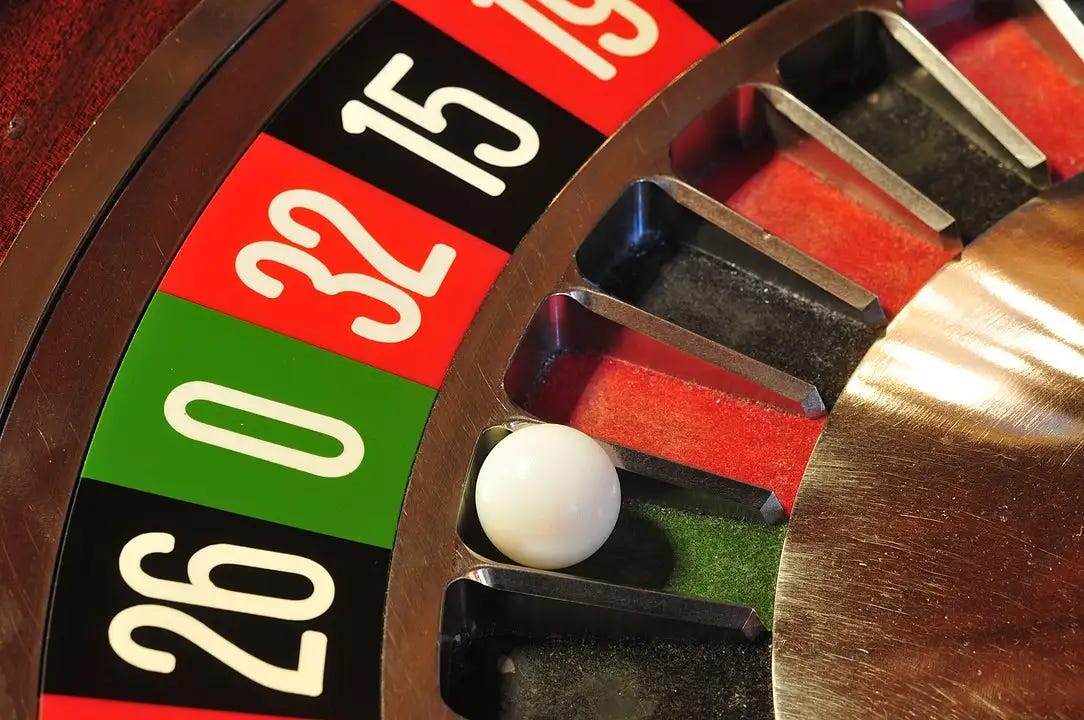There are two essential, crucial things to take from the article “The Gambler Who Beat Roulette“, and I beg that you will remember both:
1. You are meant to lose at casinos; you are not meant to win; if you win consistently, they will make you pay;
2. Nothing, but nothing, has a probability.
The story is about Croatian Niko Tosa, who roamed the world, from casino to casino, beating roulette wheels. He is ever hounded, threatened, and was even arrested once for the non-crime of winning too often. The charge the London police used to drag him to the hoosegow was “deception”. If they’re going to arrest people for “deception”, the UK will soon not have one free politician or reporter.
The police had to let him go, wonder of wonders, because they could find no evidence of “deception”, nor could they, nor anybody else, find on Tosa any kind of “device”.
“Devices” used to aid memory or to figure odds are illegal in some venues, but not in others. It scarcely matters whether you use a “device” or not, however, because you will be made unwelcome if you win consistently, regardless of how you win.
I sometimes wonder if people remember who runs casinos.
It’s not that casinos don’t want no wins. If nobody ever won, then casinos would fast empty out. It’s that they don’t want any individual to regularly best them.
Thus endeth point one. Now to point two.
Let me begin by asking this simple question: what is the probability, on a spin of an American roulette wheel (which has the numbers 0, “00”, and 1-36) of the ball landing on 30?
Please think before answering or reading further.
Right. There is no such probability. It has no probability because nothing has a probability.
Here is a second question, which is superficially similar to the first: Given a roulette wheel with the slots 0, “00”, 1-36, and a ball when the wheel is spun must land in one of these, what is the probability of the ball landing on 30?
This time we do have a probability, and it’s 1/38, just as you might have guessed.
What’s the difference between these two questions, which at first glance appear the same? This: in the first, we do not condition on any information; we ask about some mysterious quality or essence the wheel possesses, almost as if probability is contained somewhere in the wheel. This being impossible—probability is not a physical thing; it has no existence—we cannot calculate a probability.
We can in the second question, because now we have explicit premises which tell about the uncertainty we are to consider—the number of slots, the ball must fall. The first question allowed any set of premises you could bring to mind—an infinite set—while the second limited that set to one specific definite premise. We can’t calculate probabilities given this infinite set. We need one definite premise.
“I get it, I think. But Briggs, we still need to add the wheel is ‘fair’ in the second question.”
No, we don’t. To say the wheel is “fair” is redundant: it is to declare there is an exact symmetry, and to insist, even in the absence of other premises, that the probability is 1/38. It is argue like this: the probability of 30 is 1/38, given the probability of 30 is 1/38 (which is what “fair” means).
When you show up to the casino, both you and the casino will be using the second argument, with the fixed premises.
Tosa was using neither the first nor the second set of premises: he was using a third set, which he discovered for himself. But which he could not quite articulate, if forced.
He made late bets, which casinos encourage to increase the number of bets on each spin, and he can, for certain wheels, intuit the general location the ball will land. This, as they say, put the “odds in his favor”.
Casinos do their best to make the ball drop “chaotic”, which means “sensitive to initial conditions.” That has a technical meaning, but for us it means “almost impossible to predict.” The article shows the great lengths casinos take to, they hope, make the spins chaotic. They are now up to laser balancing.
That doesn’t mean any wheel is, or could be made in Reality chaotic. And, if Tosa is really performing as the article said, he can intuit the forces in play on real wheels, to enough degree to make money. This is why he not loved by gambling houses
If you were a super-physicist, and could figure all those forces yourself, then you, too, have a new set of premises which makes the spins certain, or near certain, to you. Like some physicists have done with coin flips.
Bonus
I show how that’s done with coins in this talk:
Subscribe or donate to support this site and its wholly independent host using credit card click here. Or use the paid subscription here. For Zelle, use my email: matt@wmbriggs.com, and please include yours so I know who to thank.





Every good roulette dealer knows this. They even know how to spin the wheel, depending on existing bets, to make sure they can affect who wins and who loses. They can make the ball land on an exact number, but hardly miss it more than a couple of neighboring ones. :)
And we have Professor Edward Thorp, who wrote "Beat The Dealer" and invented/discovered/rediscovered card counting. He apparently had his brake lines cut one day leaving Vegas. This was before it was "family friendly".